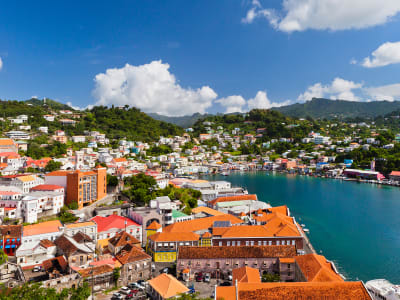
Discovered by Christopher Columbus on his third voyage to the new world, the volcanic island was named “Granada” after the rolling green hills of Granada in Andalusia, and has since become one of the world’s largest exporters in nutmeg!
Known for its nutmeg-infused shores, cascading waterfalls and cocoa plantations, the “Spice Isle” has held a magical allure over travellers for centuries. Read on to find out the 7 questions everyone’s asking about Grenada’s hidden gems, top sailing times and more, from our friendly Holiday Planner, Eleanor on her most recent visit to the lush Windward Islands.
1 – Which are the best places to visit in Grenada?
“You cannot go to Grenada without snorkelling in Grenada’s unique Underwater Sculpture Park”, Eleanor comments. Its diverse marine life and beautiful clear waters made the sandy sea floors of Molinere Bay an ideal spot for the world’s first Underwater Sculpture Park. With over 60 stone installations, these sculptures have attracted an array of aquatic life, including flounders, branded coral, fire worms and parrot fish that bring these amazing statues to life with shimmering colour!
Eleanor also highly recommends the Grand Etang Lake located in the lush Grand Etang Forest Reserve. One of the number one spots for hiking and trekking in Grenada, the Etang Forest reserve is home to a large elevated crater lake, and lush tropical trails. If you’re lucky, you may find an interesting variety of exotic wildlife in the surrounding trees, including tree frogs, armadillos, mongoose and Mona monkeys!
With 45 stunning black and white beaches to choose from, another great place to visit is the serene shores of Grand Anse beach, Eleanor says. This world-famous beach ticks most travellers bucket list with its 3km stretch of powdery white sands and azure waters, but it’s also a hot spot for locals who are drawn to the beach’s wide selection of water sports such as kayaking, snorkelling gear, scuba-diving lessons and more.
2 – On the topic of beaches, what are your favourite ones off the beaten track?
“If you’re looking for secluded sands to unwind in, I’d definitely suggest heading to Pink Gin Beach or BBC Beach”, Eleanor said. At the Southern West tip of Grenada, Pink Gin Beach is the perfect late afternoon bay to relax in after a strenuous hike in Grand Etang National Park. With its pink-hued sands, dolphin watching spots and nutmeg sprinkled cocktails, Pink Gin Beach is a must for those wanting that idyllic island vibe.
BBC beach (known to some as Morne Rouge Beach) is another firm favourite with Eleanor and her seasoned Mooring skipper born on Union Island, Hyacinth Hooper. Coined by the locals as “BBC Beach” after its first beach bar “Blanco Beach Club”, this blissful stretch of sand offers one of the most sheltered spots on Grenada’s coastline. With turquoise, millpond waters, exotic birds and local beach bars selling sauté coconut shrimp and piña coladas, this hidden gem is a must see.
3 – When is the best time to visit Grenada?
Grenada’s subtropical climate is blessed with year-round warm winds and an average temperature of 27°C. However, the peak time to go, Hyacinth recommends, is between March and April. This is not only because these are the driest months of the year towards the end of their summer, it is also the time where turtles begin to nest along the north coast!
4 – Where is the best place to find spices in Grenada?
With more spices per square mile than anywhere in the world, you are literally spoiled for choice when it comes to purchasing nutmeg, cinnamon, cloves, turmeric and ginger in the bustling markets of St George. However, if you are looking for local spices and a unique glimpse into Grenada’s colourful spice heritage, we would encourage you to visit the fragrant station of Gouyave Nutmeg Processing Cooperative located on the west coast of Grenada.
See nutmeg and mace being processed first hand, by Gouyave locals who preserved traditional sorting methods with long curing trays and wooden machines, which in its heyday exported up to 2,700 tonnes a year! Afterwards, head to their gift shop for a myriad of rich local spices and crafts.
5 – What dish should I try when I’m in Grenada?
The Caribbean is a prime spot for international foodies, and if there was one dish that epitomised Grenada’s distinctive culinary style, it would be oil down. This traditional stew is local comfort food at its finest, combining either cod, herring or salted pork with coconut milk, bananas, turmeric spices, breadfruit and callaloo for a unique explosion of flavours you do not want to miss.
6 – What currency should I bring with me to Grenada?
Although major credit cards are accepted by most hotels, shops and car rentals, Eleanor recommends bringing Eastern Caribbean Dollars (XCD) for local beach bars, spice markets and day trips. If you are looking to exchange currency, you are likely to get more favourable rates at banks and post offices.
7 – What’s the story behind “Happy Island”?
In 2002, local visionary Janti Ramage, created a tiny outpost just a few hundred meters off the coast of Union Island made entirely of conch shells.
This colourful oasis near Clifton Harbour is not only the perfect place to go for local bottled blonde beer and refreshing rum punch, it also stands as a unique solution to the natural littering of conch shells in the Grenadines. Aptly named, “Happy Island”, this floating bar truly exemplifies island living, and is a great way to end your chartered holiday in Grenada.
Contributor
Leslie Montenegro
Step Aboard Here
Start your experience with The Moorings on land and sign up to receive e-mails from us about yachts, offers and destinations.
By clicking 'Sign up' you confirm that you have read and understood our Privacy Policy and consent to our use of your information.



